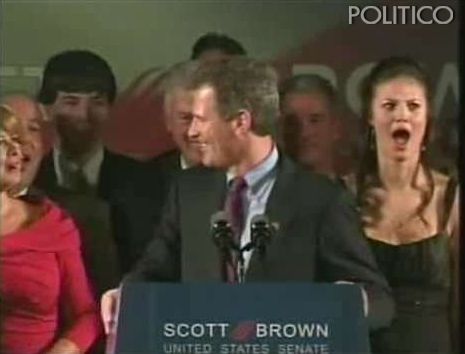Why Yesterday’s Supreme Court Decision Was Right — A Rant
I had to run out the door yesterday just after that wonderful Supreme Court decision came down, so I didn’t have time to write a little tribute to it. But it’s thrilling to see free speech reaffirmed like that, and I think I should explain why.
To sum it up: in the case the Supreme Court decided yesterday, the federal government tried to prevent a documentary about Hillary Clinton from being aired close to her election. The federal government tried to squelch political speech exactly when it was most needed and most effective. How? On the basis that the documentary was a corporate-funded television broadcast.
So? It’s speech. That’s what the Supreme Court recognized yesterday.
The scary implications of the movie-banners’ position became clear at oral argument when a government lawyer suggested the government could also ban corporate-funded books just before an election.
Now are you starting to see the problem? Of course, the government lawyer didn’t. He’s in the business of defending political censorship, after all. Why should it matter what form the speech we want to censor takes?
But this is oppressive and wrong. In America, we do not squelch political speech.
I have been a consistent opponent of this terrible, unconstitutional law forever. They passed this dog of a law back in 2002, and I have been railing against it since the inception of my blog in 2003, when I equated it to the repeal of the First Amendment.
In 2004, when the FEC wanted to regulate a Michael Moore movie, I was furious:
[A]dvisory counsel for the FEC has advised the Commission that, in his opinion, the McCain-Feingold law prevents Michael Moore from advertising his film “Fahrenheit 9/11″ after July 30, 2004.
I am not joking.
I’ll bet a lot of you thought I was being hysterical when I equated McCain-Feingold with the repeal of the First Amendment. How do you feel now? — now that there is a serious possibility that a filmmaker cannot advertise his film because it contains speech calculated to encourage people to oppose a sitting president?
I despise Michael Moore. But people like Kevin Murphy and me believe that jerks like Michael Moore have the right to make whatever ridiculous arguments they wish to make. And if those arguments are made in a film, and Moore or the distributor of his film wish to promote that film, they have that right under the First Amendment.
Now, the Supreme Court has recognized that right.
The Very Serious Law Professor Rick Hasen, quoted all over creation yesterday as bemoaning yesterday’s decision, once talked about whether government could take Stephen Colbert’s show away when he announced a tongue-in-cheek campaign for the presidency. I called his post “a very sober discussion — you can almost visualize Hasen furrowing his brow as he taps out the post — of whether someone can exercise his core First Amendment rights without running afoul of the blatantly unconstitutional obstacles that Our Caring Government has put in our way.”
This is how insane the pro-censorship crowd gets.
You have to defend these principles for the other guy — because if you don’t, you’ll lose them for yourself. Democrats tried to use this ridiculous law to squelch the speech of Swift Boat Vets in 2004. Democrats are notorious anti-free speech thugs, as they have repeatedly proven. No wonder Barack Obama is upset about yesterday’s decision. It removes the power of his Executive Branch to go around stamping out dissent — which he would sorely love to do under the rubric of “campaign finance reform.”
Sorry, Barry. Won’t wash. You’ll have to find some other excuse.
To those who claim that money is not speech, I explained in 2003:
[T]he First Amendment is incompatible with this sort of legislation.
Let me make this as clear as I can. If I want to run an ad saying George Bush (or, if I am clinically insane, Howard Dean) is the greatest thing to happen to the world since sliced bread, there is this thing called the First Amendment that says I can do that. If I want to spread that message on full-page ads in every newspaper in the United States, I can do that, no matter the cost. I don’t think any of this is subject to debate.
Of course, doing so takes money — but in the real world, it takes money to effectively communicate speech. Simon at Stubborn Facts quotes a wonderful explanation by Justice Scalia from an earlier case:
In any economy operated on even the most rudimentary principles of division of labor, effective public communication requires the speaker to make use of the services of others. An author may write a novel, but he will seldom publish and distribute it himself. A freelance reporter may write a story, but he will rarely edit, print, and deliver it to subscribers. To a government bent on suppressing speech, this mode of organization presents opportunities: Control any cog in the machine, and you can halt the whole apparatus. License printers, and it matters little whether authors are still free to write. Restrict the sale of books, and it matters little who prints them.
. . . . [W]here the government singles out money used to fund speech as its legislative object, it is acting against speech as such, no less than if it had targeted the paper on which a book was printed or the trucks that deliver it to the bookstore.
. . . .
It should be obvious, then, that a law limiting the amount a person can spend to broadcast his political views is a direct restriction on speech. That is no different from a law limiting the amount a newspaper can pay its editorial staff or the amount a charity can pay its leafletters. It is equally clear that a limit on the amount a candidate can raise from any one individual for the purpose of speaking is also a direct limitation on speech. That is no different from a law limiting the amount a publisher can accept from any one shareholder or lender, or the amount a newspaper can charge any one advertiser or customer.
Bingo.
Yesterday’s decision doesn’t cure all the ills of campaign finance reform laws. There still exist laws against speech in coordination with political campaigns — laws which the Court continues to regard as constitutional, but which I believe are not. The government still from time to time asserts a supposed power to regulate bloggers. Most recently, they have purported to require disclosure of payment for products one endorses. They talk about giving a “media exemption” for us bloggers to say what we like about political candidates without having our posts be considered political contributions. In all cases, Our Government Overlords assert the right to regulate bloggers in ways they wouldn’t dare try to regulate the press.
They can go to hell. I won’t follow their unconstitutional rules. I will do what I would do absent their rules. I will not beg for a media exemption or sign petitions begging for the rights that are already mine. I say here plainly that I won’t. Instead, I take a simple pledge:
If the FEC makes rules that limit my First Amendment right to express my opinion on core political issues, I will not obey those rules.
I reaffirm that here.
Yesterday’s decision was a step in right direction. But it did not end the tyranny of those who seek who use government’s power to shut us up. We will have to keep fighting the battle.
But it’s a lot easier today than it was on Wednesday.




